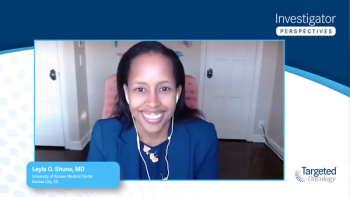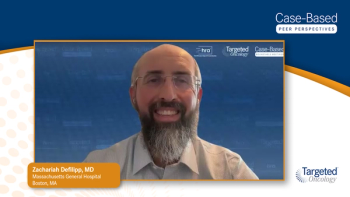
Opinion|Videos|May 21, 2025
CABINET Trial: Results
Author(s)Thorvardur R. Halfdanarson, MD
A panelist discusses how the CABINET trial showed significant progression-free survival benefits for cabozantinib compared with placebo (particularly in pancreatic neuroendocrine tumors (NETs), why progression-free survival (PFS) is a meaningful end point for NETs, and that safety findings revealed familiar adverse effects requiring dose reductions in about two-thirds of patients.
Advertisement
Video content above is prompted by the following:
CABINET Trial Results
Key Themes:
- Progression-Free Survival (PFS) as Primary End Point:
- PFS is an agreed-upon end point by an NCI task force for NETs
- Appropriate due to generally longer overall survival in NETs compared with other metastatic solid tumors
- PFS serves as a surrogate for benefit and possibly overall survival
- Extrapancreatic Cohort Results:
- PFS: 8.4 months (cabozantinib) vs 3.9 months (placebo); statistically significant
- Overall survival: 21.9 months vs 19.7 months; not statistically significant
- 33% crossed over from placebo to cabozantinib
- Pancreatic Cohort Results:
- PFS: 13.8 months (cabozantinib) vs 4.4 months (placebo); more pronounced difference
- Overall survival: 40 months vs 31.1 months; not statistically significant
- 41% crossed over from placebo to cabozantinib
- Safety Profile:
- No new safety signals identified
- Two-thirds of patients required dose reduction
- Average daily dose was just under 40 mg per day in both cohorts
Notable Insights:
Dr Halfdanarson observed that the more pronounced PFS benefit in pancreatic NETs was not surprising, as these tumors have historically been responsive to VEGF-directed therapies like sunitinib.
Advertisement
Latest CME
Advertisement
Advertisement
Trending on Targeted Oncology - Immunotherapy, Biomarkers, and Cancer Pathways
1
FDA Accepts BLA for Ivonescimab in Pretreated EGFR-Mutated NSCLC
2
Onvansertib Triplet Shows Dose-Dependent Frontline Benefit in RAS-Mutant Metastatic CRC
3
FDA Oncology Update January 2026: New Horizons in Precision Medicine
4
The Targeted Pulse: New Standards in Myeloma, Melanoma, and More
5



















